
Latest News Regarding
Horn of Africa
Kenya gets mandate to help in piracy fight
Kenya gets mandate to help in piracy fight

Source: TheEast African, Monday May 27, 2024
By ANTHONY KITIMO

European Union Ambassador Henriette Geiger addresses the press at the end of bilateral training between European Naval Force, Kenya Navy and the Kenya Coast Guard Service personnel on May 23, 2024. PHOTO | WACHIRA MWANGI | NMG
The United States and the European Union (EU) have intensified the fight against increasing militant groups in the high seas, with Kenya picked as the second country, after Seychelles, to accept and prosecute suspects of maritime crimes.
Nations with top economies have raised concern over disruption of maritime trade in the Red Sea by Yemen’s Houthis and resurgence of piracy in Somalia saying the illegal groups ought to be eliminated.
European Union Naval Force (EU Navfor) has confirmed that Kenya will assist Seychelles in handling maritime crimes suspects due to the increasing maritime cases reported
EU Ambassador to Kenya Henriette Geiger said maritime security is a concern as it has led to disruption of trade and EU will work with different governments to suppress insecurity in the waters.
Speaking in Mombasa during the closure of marine training between Kenya and EU Nation forces, Ms Geiger said EU Navfor will extend its presence in different areas where piracy, narcotics and human trafficking and other crimes are reported.
“EU Navfor Somalia managed to suppress piracy in its previous years but with the current operation Atalanta, the forces will work with different governments to address emerging piracy and the illegal group at Suez Canal,” said the Ambassador.
Accompanied by Spanish ambassador Christina Diaz and her Italian counterpart Roberto Natali, Ms Geiger said although the current threat by Somali piracy is classified as moderate off the Somali Coast, the attacks by Yemen’s Houthi rebels has remained the biggest worry, resulting in the rerouting of vessels to a longer route through the Cape.
“Seychelles has played a key role in handling suspects arrested in the waters and now Kenya will be another country which EU has entered legal agreement with to allow for the trial of suspected pirates arrested by warships,” said the ambassador.
On May 14, six suspected pirates were handed over to the Seychelles authorities for trial by EU Navfor’s Operation Atalanta, allegedly from Somalia who were involved in the piracy attack to the Marshall Islands-flagged Merchant Vessel Chrystal Arctic on the May 10.
Operation Atalanta has legal agreements with Seychelles, which allows for the trial of suspected pirates arrested.
There have been growing concerns over a resurgence of Somali piracy with EU Navfor saying that two or more pirate action groups are active in the area of Socotra Island and 500m East of Socotra in the northwest Indian Ocean near the Gulf of Aden.
The Commanding Officer of the ship, Rear Admiral Francesco Saladino said Atalanta remains committed to supporting the country in the prosecution of the case until it goes to trial.
“Atalanta has a legal finish with countries it operates within their territories which guarantees the entire process within piracy events from deter, arrest, detention, and prosecution in accordance with international law,” said Mr Saladino.
Piracy, although largely suppressed, has not yet been eradicated. Criminal networks associated with piracy have diversified their activities and reoriented their activities towards other maritime crimes, such as the illicit trade of weapons and human trafficking.
At the sametime, deputy commander for civil-military engagement at US Africa Command Ambassador Robert Scott, visited Madagascar, Mauritius and Seychelles last week to meet with partner nation government officials and discuss the countries’ regional efforts to address maritime security challenges.
A focus throughout the trip was on the impact to the countries and ways to counter maritime security challenges the islands face, in waters that are seeing increasing traffic.
“Piracy, Illegal, unreported and unregulated (IUU) fishing, trafficking, and other maritime security challenges severely impact the economies of African coastal nations, supporting their efforts is crucial, especially given the increased maritime traffic due to the conflict in the Gulf of Aden,” said Mr Scott.
Mr Scott’s visits to the Regional Coordination Operations Centre in Seychelles and Regional Maritime Information Fusion Center in Madagascar showcased how nations in the West Indian Ocean are working to counter these challenges.
The ambassador’s visit highlights US Africa Command’s 3D approach, which leverages diplomacy, development, and defense collaboration.
US Africa Command, headquartered in Stuttgart, Germany, is one of 11 US Department of Defense combatant commands, each with a geographic or functional mission that provides command and control of military forces in peace and war.
US Africa Command employs the broad-reaching diplomacy, development, and defense approach to foster interagency efforts and help negate the drivers of conflict and extremism in Africa.
New UN envoy arrives in Somalia to advance peace efforts
New UN envoy arrives in Somalia to advance peace efforts

UN: Monday May 27, 2024
Acting Special Representative of the UN Secretary-General for Somalia and Head of the UN Assistance Mission for Somalia (UNSOM) James Swan arrived in Mogadishu on Sunday to boost stabilization efforts.

UNSOM said in a statement issued in Mogadishu, the capital of Somalia, that Swan’s focus will be to support the Somali government and the Somali people in advancing their peace, security, development and state-building priorities.
UN Secretary-General Antonio Guterres announced the designation of Swan on May 14.
“Swan then held extensive meetings with UN headquarters leadership prior to his arrival in Mogadishu,” UNSOM said.
Swan previously served as the special representative for Somalia and head of UNSOM from 2019 to 2022, after a long career in the United States diplomatic service.
Swan was deputy assistant secretary of state for African affairs from 2006 to 2008, and director of African analysis in the State Department’s Bureau of Intelligence and Research from 2005 to 2006.
Prior to holding these assignments, Swan held various assignments in the Democratic Republic of the Congo, the Republic of Congo, Somalia, Cameroon, Nicaragua and Haiti.
Swan’s arrival comes after Somalia formally requested the UN to terminate the mandate of UNSOM in the country following a thorough consideration of its strategic priorities.
Somali Foreign Minister Ahmed Fiqi said recently that the Somali government will no longer request a mandate renewal of resolution 2705 (2023).
Somali Prime Minister meets Swedish Justice Secretary to strengthen bilateral relations
Somali Prime Minister meets Swedish Justice Secretary to strengthen bilateral relations

Source: Hiiraan Öonline, Monday May 27, 2024
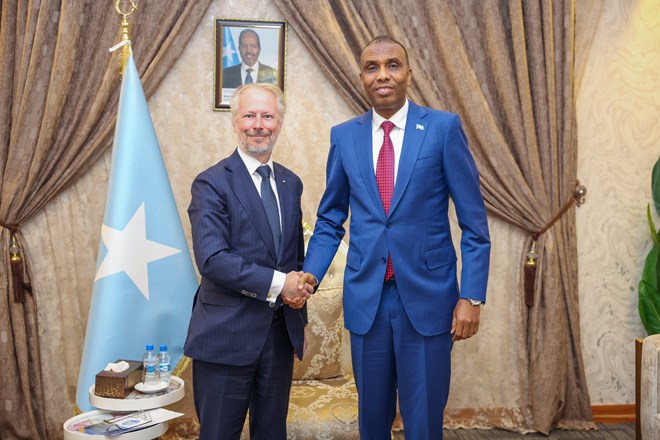
Mogadishu (HOL) – Somali Prime Minister Hamza Abdi Barre met with Anders Hall, the State Secretary of the Swedish Ministry of Justice, in Mogadishu on Monday.
Prime Minister Barre and Mr. Hall discussed bolstering the mutual relations between Somalia and Sweden in all areas of shared benefit.
Barre praised the Swedish government for its support to Somalia and urged it to contribute further to the government’s efforts in development and democratization.
Mr. Hall commended the Somali government’s unwavering commitment to countering international terrorism and acknowledged the tangible advancements in security made against the Kharijites.
Sweden is one of the largest donors to Somalia, supporting peacebuilding, democracy, human rights, equal health, and issues related to the environment, climate, and energy.
Egypt reaffirms full support for Somalia amid rising regional tensions with Ethiopia
Egypt reaffirms full support for Somalia amid rising regional tensions with Ethiopia

Source: Hiiraan Online, Monday May 27, 2024
Cairo, Egypt (HOL) – Egyptian Prime Minister Moustafa Madbouli has reiterated Egypt’s “full support” for Somalia, during a meeting with Somali Ambassador Elias Sheikh Omar Abu Bakr on Sunday at the Cabinet headquarters in the New Administrative Capital.
Madbouli stressed that Somalia’s stability is essential for achieving security, and stability in the region. He expressed his desire to strengthen cooperation between Egypt and Somalia and conveyed his best wishes to the Somali Prime Minister through Ambassador Abu Bakr.
Ambassador Abu Bakr, who is wrapping up his tenure in Egypt, thanked Egyptian institutions for their support. He emphasized Somalia’s ongoing need for Egyptian assistance, particularly given the political and security challenges it faces.
The ambassador emphasized Cairo’s active role in assisting Mogadishu, stating that Somalia’s stability requires ongoing support from Arab nations, particularly Egypt.
The reaffirmation of support comes amid heightened regional tensions involving Somalia and Ethiopia. President Abdel Fattah el-Sisi declared in January that Egypt would not tolerate any threats to Somali security. His remarks were in response to Ethiopia’s agreement with Somaliland, which included establishing a maritime base and gaining access to the port of Berbera. Somali President Hassan Sheikh Mohamud denounced the deal as a violation of international law and sought regional support during his recent visit to Egypt, meeting with Arab League chief Ahmed Aboul Gheit and Al-Azhar Mosque’s Grand Imam, Sheikh Ahmed al-Tayeb.
The development adds another layer of complexity to the already-strained relations between Egypt and Ethiopia, primarily due to disputes over the Grand Ethiopian Renaissance Dam on the Blue Nile. For over a decade, Egypt, Sudan, and Ethiopia have struggled to reach a consensus on the dam’s operation and filling, which remains a significant regional issue.
Violence Escalates in Sudan’s North Darfur Region
Violence Escalates in Sudan’s North Darfur Region
Source: Aljazeera published on 17 May 2024 an article titled “‘Hell on Earth’ as Violence Escalates in Sudan’s el-Fasher.”
Violence is escalating in North Darfur region of Sudan as the paramilitary Rapid Support Forces (RSF) and allied militias try to take the last stronghold in Darfur held by the Sudan Armed Forces. The focus of the conflict is el-Fasher where more than 1.8 million residents and internally displaced people are encircled by the RSF and at imminent risk of famine.
Self-declared state of Somaliland celebrates 33rd Independence Anniversary
Self-declared state of Somaliland celebrates 33rd Independence Anniversary

Source; Hiiraan Online, Saturday May 18, 2024

Hargeisa (HOL) – The self-declared state of Somaliland celebrated its 33rd anniversary of independence on Saturday with colourful events held throughout the Somaliland regions.
Somaliland President Muse Bihi Abdi, opposition leaders, and various officials attended the commemoration of May 18 in Hargeisa, where the main event took place.
advertisements
“Somaliland is not a region seceding from a country as Africa fears. Everyone acknowledges that we were two countries united. In the 2005 African Union report, it was stated that Somaliland is different from other African issues,” said President Bihi.
Regarding the recent MoU deal between Ethiopia and Somaliland, President Bihi said that the Somali government cannot stop the Red Sea agreement and that it will be implemented soon. He accused Somalia of misleading the world and making the agreement seem dangerous.
“Ethiopia has asked us to provide them with a military base and become the first to recognize Somaliland, and that should not be ignored,” said President Bihi.
The landlocked Ethiopia and Somaliland signed a memorandum of understanding on January 1 to lease 20 km (12 miles) of coastline in Somaliland. Under the deal, the coastal area around the port of Berbera on the Gulf of Aden will be used by Ethiopia for 50 years for military and commercial purposes.
Former President of Somaliland Dahir Riyale Kaahin, who also spoke at the occasion, called on the people of Somaliland for unity and togetherness on the 33rd anniversary of Somaliland.
Despite functioning as a de facto state with its own passports and constitution, Somaliland remains unrecognized by the African Union, the United Nations, and most countries, including the United States.
War in Sudan Disrupts South Sudan’s Oil Exports
War in Sudan Disrupts South Sudan’s Oil Exports
Source: The International Crisis Group published on 15 May 2024 a commentary titled “South Sudan on Edge as Its Neighbor’s War Disrupts Oil Exports.”
The civil war in Sudan has severely disrupted oil transported by pipeline from South Sudan to Port Sudan, depriving southerners of petrodollars, the government’s main source of revenue. One of these pipelines, responsible for about two thirds of South Sudan’s oil exports, broke down in February and will require months of complex repairs that must be made amid active combat.
South Sudan’s government will run out of money and the national currency’s value will plunge. Chronic food shortages will worsen, presaging renewed instability and fighting.
Sudanese refugees flee UN camp in Ethiopia following attackså
Sudanese refugees flee UN camp in Ethiopia following attackså

Source: Reuters, Wednesday May 8, 2024
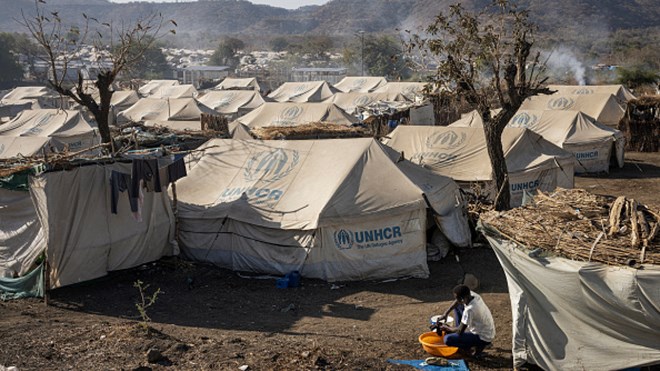
At least 1,000 Sudanese refugees have fled a camp run by the United Nations in northern Ethiopia following a series of shootings and robberies, three of the refugees and the United Nations said.
The refugees said about 7,000 of the 8,000 residents of the Kumer camp left on foot early on Wednesday morning after they were attacked and robbed by local militiamen.
They said they were detained by the police shortly after leaving the camp, which is 70 km (43 miles) from the Sudanese border in Ethiopia’s Amhara region. They asked not to be named for fear of reprisals.
The United Nations refugee agency UNHCR said it was aware that 1,000 people had left Kumer on Wednesday because they felt unsafe after a series of security incidents.
Spokespeople for the Ethiopian government, the Amhara regional administration, the federal police and the national refugee agency did not respond to requests for comment.
More than 1.6 million Sudanese people have fled their country since civil war broke out in April 2023 between the army and a rival paramilitary unit. About 33,000 have crossed into Ethiopia, according to UNHCR.
Sudanese refugees in Kumer told UNHCR in a recent letter that they have been facing rampant insecurity for months, including kidnappings for ransom, killings and armed robberies.
Amhara militiamen have been battling federal forces for nearly a year across the region in a conflict that left more than 200 people dead last year, according to the United Nations.
“We can no longer stay here,” one of the refugees told Reuters by phone. “We have been abducted, killed, and attacked repeatedly since we arrived here in June. We have decided to go back to Sudan, despite the war.”
UNHCR described the situation in the camp as “very difficult.”
“The reasons they gave for leaving were primarily because they did not feel safe in the settlement,” the agency said in a statement to Reuters.
“This follows several reports of security incidents, including crime, theft, armed robbery, shooting and alleged abductions.”
Reporting by Giulia Paravicini; Editing by Hereward Holland, Editing by William Maclean
Qatar tourism chairman meets minister of commerce and tourism of Djibouti
Qatar tourism chairman meets minister of commerce and tourism of Djibouti

Source: QNA, Tuesday May 7, 2024

HE Chairman of Qatar Tourism Saad bin Ali Al Kharji met with HE Minister of Commerce and Tourism of the Republic of Djibouti Mohamed Warsama Dirieh, who is visiting the country.
The meeting discussed ways to enhance collaborations within the tourism sectors of both countries.
In this context, Qatar Tourism has committed to provide tourism training opportunities that will contribute to the development of the tourism sector in the Republic of Djibouti and support personnel working in its tourism sector by providing the esteemed Service Excellence training. The Service Excellence department at Qatar Tourism has meticulously crafted a two-phase programme set to commence later this year.
Commenting on the meeting, HE Saad bin Ali Al Kharji said, “Qatar Tourism continues to expand collaborations with international tourism governing bodies. Our meeting with HE Minister of Commerce and Tourism of the Republic of Djibouti reflects Qatar Tourisms dedication to bolstering ties in the international market and fostering international collaboration for growth in line with the tourism strategy 2030.
Somali Prime Minister praises bilateral agreements with Kenya
Somali Prime Minister praises bilateral agreements with Kenya

Source: Hiiraan, Tuesday May 7, 2024
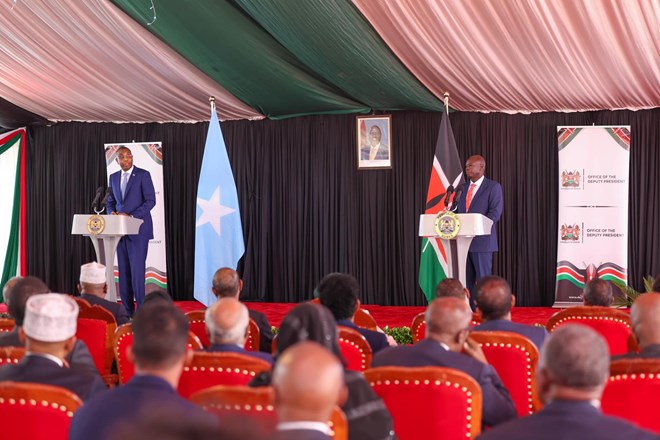
Nairobi (HOL) – Somali Prime Minister Hamza Abdi Barre commended the bilateral agreements on political consultations, education, and defence between Somalia and Kenya, which the two countries signed in Nairobi on Monday night.
Speaking at a bilateral meeting between Somalia and Kenya in Nairobi on Tuesday, he highlighted the historical and fraternal relationship between the two countries, regional cooperation for stability and development, and Somalia’s commitment to playing an active role in East African connectivity.
Prime Cabinet Secretary Musalia Mudavadi who is also the cabinet secretary for Foreign and Diaspora Affairs said that the three bilateral instruments aim to further solidify bilateral cooperation for the mutual benefit of the people of the two countries.
Prime Minister Barre and the Vice President led the delegation from Somalia, while Kenya attended the Kenya-Somalia Joint Commission for Cooperation meeting concluded in Nairobi on Tuesday.
The Prime Minister emphasized that the bilateral talks provide a good basis for strengthening the relationship between the two countries, expressing hope for the progress of the talks and the agreements to be reached.
Barre pointed out the negative effects of climate change affecting both countries, stressing the importance of climate cooperation and environmental protection.
UN Secretary-General warns of growing threats to media freedom
UN Secretary-General warns of growing threats to media freedom
Source: Thanassis Stavrakis/AP
By Agencies
Last updated: 03/05 – 18:03
PRESS FREEDOM
On the eve of World Press Freedom Day, UN Secretary-General Antonio Guterres delivered a warning about the escalating dangers faced by journalists worldwide.
Speaking passionately about the critical role of journalism in informing and engaging the public, Guterres emphasized the urgent need to safeguard press freedom and protect media professionals.
“…. The United Nations recognizes the invaluable work of journalists and media professionals to ensure that the public is informed and engaged. Without facts, we cannot fight mis- and disinformation. Without accountability, we will not have strong policies in place. Without press freedom, we won’t have any freedom. A free press is not a choice, but a necessity” said Antonio Guterres.
Guterres underscored the indispensable role of journalists and media practitioners in upholding truth and accountability. He stressed that without access to accurate information, combating misinformation and disinformation becomes impossible.
“Media freedom is under siege. And environmental journalism is an increasingly dangerous profession. Dozens of journalists covering illegal mining, logging, poaching and other environmental issues have been killed in recent decades. In the vast majority of cases, no one has been held to account. UNESCO reports that in the past 15 years, there have been some 750 attacks on journalists and news outlets reporting on environmental issues. And the frequency of such attacks is rising….” he added.
Acknowledging the significant risks faced by environmental journalists, Guterres lamented the increasing peril associated with covering issues such as illegal mining, logging, and poaching. He revealed that over recent decades, dozens of journalists reporting on environmental issues have been killed, with perpetrators largely escaping justice. According to UNESCO, there have been approximately 750 attacks on journalists and news outlets covering environmental issues in the past 15 years, indicating a troubling trend of violence targeting media professionals.
Guterres urged all nations to recognize the gravity of the situation and take decisive action to halt the assault on media freedom.
He emphasized that World Press Freedom Day serves as a critical reminder of the fundamental importance of a free press in democratic societies. Established by the UN General Assembly in December 1993, World Press Freedom Day is observed annually on May 3rd as an opportunity to reaffirm the principles of press freedom and advocate for the protection of journalists worldw
1 hour ago
3 hours a
03/05 – 11:27
US Special Envoy for Sudan Statement before Senate Foreign Relations Committee
US Special Envoy for Sudan Statement before Senate Foreign Relations Committee
Source: US Special Envoy for Sudan Tom Perriello met with the Senate Foreign Relations Committee on 1 May 2024 and opened with a statement titled “Conflict and Humanitarian Emergency in Sudan: An Urgent Call to Action.”
Perriello emphasized the urgency of the situation in Sudan and spelled out the three-pronged policy by the United States to end the conflict.
Ethiopia: New Ethnic Conflict in Western Tigray?
Ethiopia: New Ethnic Conflict in Western Tigray?
Source: Reuters published on 3 May 2024 an article titled “Ethiopia’s Amhara Militia Says Resettlement Plan ‘Beats War Drum’.”
Many Tigrayans were displaced from disputed territory in Western Tigray during the civil war that ended in November 2022. A plan to return some of the internally displaced Tigrayans to this region has resulted in alarm bells being sounded by the Amhara Fano militia that now occupies the land.
Uzbekistan establishes diplomatic relations with Djibouti
Uzbekistan establishes diplomatic relations with Djibouti
SourceSaturday May 4, 2024
This East African nation becomes the 149th state to establish diplomatic ties with Uzbekistan.

On May 2 of this year, Uzbekistan and Djibouti signed a Joint Communiqué establishing diplomatic relations, the press secretary of the Ministry of Foreign Affairs, Akhror Burkhanov, said.
The document was signed on behalf of the two countries’ governments by Ulugbek Lapasov, the Permanent Representative of Uzbekistan to the UN, and Mohamed Siad Doualeh, the Permanent Representative of the Republic of Djibouti to the UN.
This diplomatic relationship was established in support of the principles and objectives of the UN Charter, and international agreements, notably those underpinning peace and security, equality among states, independence, territorial integrity, and non-interference in the internal affairs of other states.
It is noteworthy that this East African country is the 149th state to establish diplomatic relations with Uzbekistan.
European leaders laud tougher migration policies but more people die on treacherous sea crossings
Source, AP, European leaders laud tougher migration policies but more people die on treacherous sea crossings
1 of 2 |
FILE – Migrants, mainly from sub-Saharan Africa, are stopped by Tunisian Maritime National Guard at sea during an attempt to get to Italy, near the coast of Sfax, Tunisia, Tuesday, April 18, 2023. The bodies of 19 people were recovered Tuesday, April 23, 2024, off the coast of Tunisia, one of the primary points of departure for those seeking to traverse the Mediterranean Sea to Europe. More than 49,000 people have come to Europe by sea this year, including more than 7,000 from Tunisia to Italy. (AP Photo, File)Read More
2 of 2 |
FILE – Migrants, mainly from sub-Saharan Africa, are stopped by Tunisian Maritime National Guard at sea during an attempt to get to Italy, near the coast of Sfax, Tunisia, Tuesday, April 18, 2023. The bodies of 19 people were recovered Tuesday, April 23, 2024, off the coast of Tunisia, one of the primary points of departure for those seeking to traverse the Mediterranean Sea to Europe. More than 49,000 people have come to Europe by sea this year, including more than 7,000 from Tunisia to Italy. (AP Photo, File)Read More
BY SAM METZ AND BARBARA SURKUpdated 6:53 PM GMT+2, April 24, 2024Share
RABAT, Morocco (AP) — Children dead in the English Channel. Morgues full of migrants reaching capacity in Tunisia. Police in Cyprus patrolling off the island nation’s eastern coast to thwart boats loaded with Syrian refugees.
With pivotal June elections for the European Parliament getting closer, such scenes of despair and tragedy are complicating efforts to open a new chapter in Europe’s migration policy. As the European Union and countries across the 27-member bloc adopt tougher measures on migrants, politicians largely focus their rhetoric on the need to police human trafficking and smuggling — rather than the human drama playing out at sea.
Human rights organizations have for years warned that tougher policies and police crackdowns are not deterring migration but driving desperate people to attempt life-threatening journeys across treacherous waters. Thousands have paid with their lives.
On Tuesday, Tunisia’s Coast Guard recovered 19 bodies near a section of the country’s coastline known as a primary point of departure for boats taking off for Italy. Separately, five smugglers were arrested on human trafficking charges, authorities said. Tunisia has already intercepted about 21,000 migrants trying to cross the sea to Europe this year.
READ MORE
Dozens dead, missing after migrant boat sinks off Djibouti

Source: DW, Wednesday April 24, 2024
It is the latest tragedy on a route that has become popular among thousands of migrants trying to reach Gulf countries from the Horn of Africa.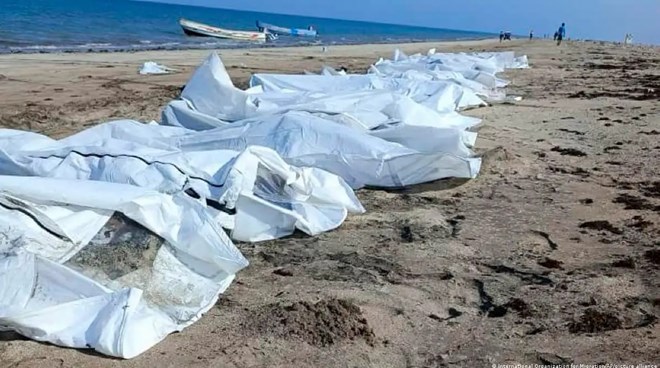
At least 16 people have died after a boat they were traveling in from Yemen capsized off the coast of Djibouti, the United Nations’ International Organization for Migration said on Tuesday.
In a post on X, formerly known as Twitter, the IOM wrote that “Tragedy as boat capsizes off Djibouti coast with 77 migrants on board including children,” adding that at least 28 people were missing.
The Ethiopian Ambassador to Djibouti Berhanu Tsegaye, wrote, on X that 33 people survived the disaster. Local authorities were assisting IOM with search and rescue operations.
Tsegaye wrote the boat was carrying Ethiopian migrants from Yemen and that the accident occurred on Monday night off Godoria in northeastern Djibouti.
Accident two weeks after a similar incident that killed 38 migrants
Monday’s accident came some two weeks after another boat, also carrying a majority of Ethiopian migrants, also capsized off Djibouti.
At least 38 migrants died in a boat carrying 66 migrants.
The IOM says every year, tens of thousands of migrants from the Horn of Africa, particularly Ethiopia and Somalia, leave the continent via Djibouti in the hope of finding work in Saudi Arabia and the Gulf nations.
However, many are unsuccessful, and thousands are stranded in Yemen where they experience extremely harsh conditions.
According to IOM figures, around 100,000 people, almost half of them women and children, made the dangerous journey across the coast from Djibouti to Yemen in 2023.
The IOM says the route is dangerous as traffickers target migrants, and they face kidnap, arbitrary arrest, and forced recruitment into warring groups, particularly in Yemen.
Somali President attends ceremony marking implementation of Turkey-Somalia defense agreement
Somali President attends ceremony marking implementation of Turkey-Somalia defense agreement

Source: Hiiraan Online, Wednesday April 24, 2024
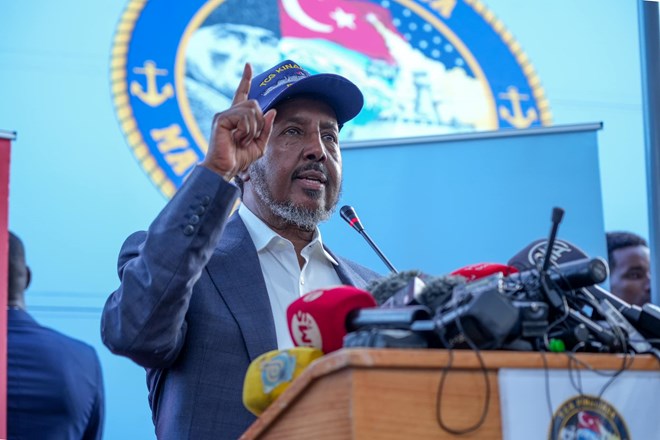
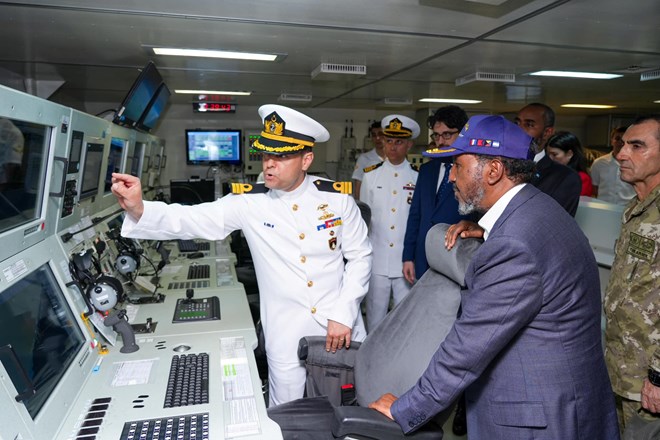

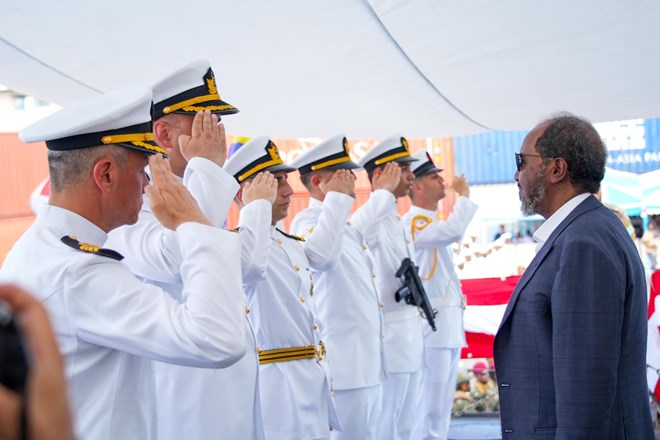

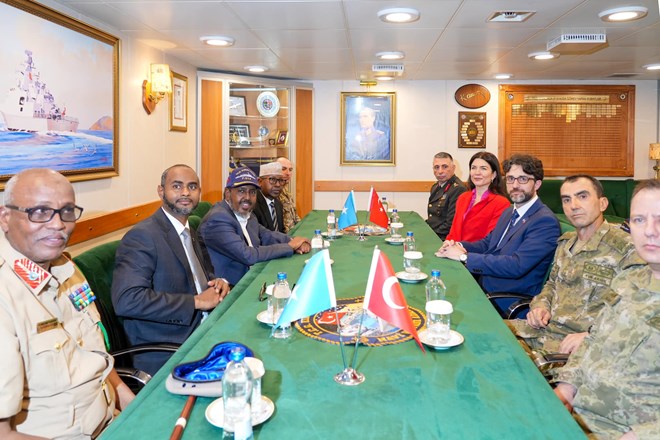
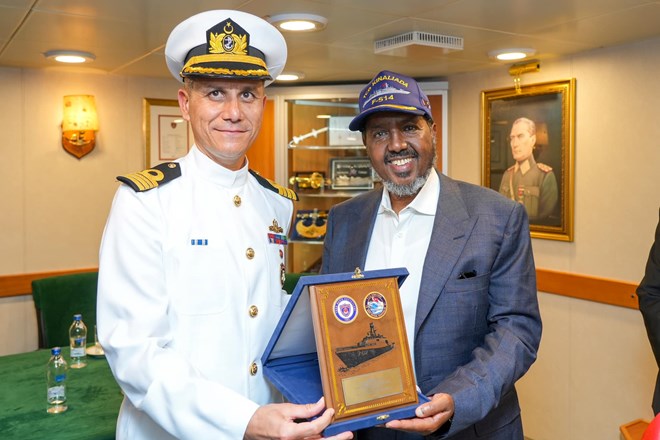
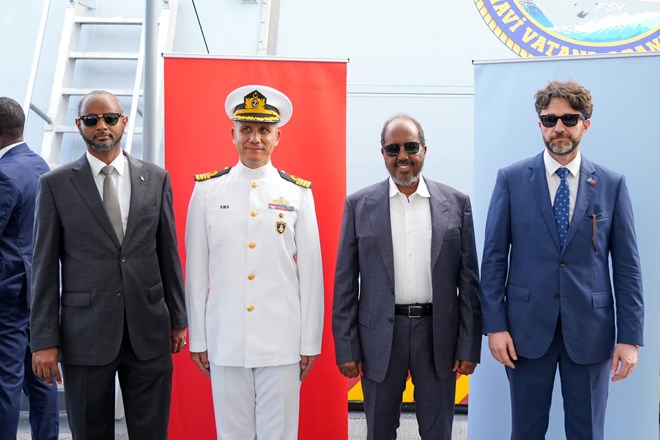
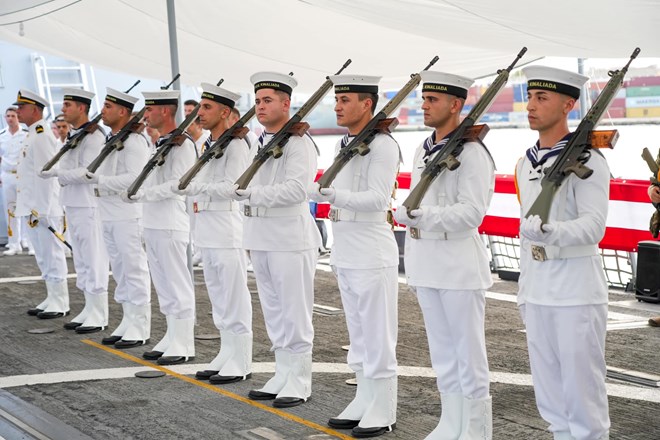


Mogadishu (HOL) — Somali President Hassan Sheikh Mohamud, accompanied by ministers and the Turkish Ambassador, participated in a ceremony aboard Türkiye’s domestically produced TCG Kınalıada Corvette, which docked at Mogadishu Port on Tuesday in honour of Türkiye’s National Sovereignty and Children’s Day.
President Mohamud highlighted the strategic partnership between Türkiye and Somalia, focusing on humanitarian aid, security, defense, and economic development.
He emphasized the historical significance of the warship’s visit to Somalia’s territorial waters, stating it symbolized the enduring fraternal relations between the two nations and marked a new era for Somalia’s maritime security.
He remarked, “The government of our brothers in Turkey, with whom this agreement is made, is a country and people we know, who have shown us support many times. It is a friendly and brotherly country in which we can trust this important cooperation for the defense of our nationalism and territorial unity.”
Turkish Foreign Minister Hakan Fidan reiterated Türkiye’s unwavering support for Somalia’s sovereignty and territorial integrity. He emphasized the deep historical ties between the two nations, stating on his X (formerly Twitter), “The historical relations between our two countries now point to a unity of destiny.”
President Mohamud thanked Türkiye for its support in safeguarding Somalia’s territorial waters under the recently signed Defense and Economic Cooperation agreement.
Days ago, the Director General of the Somali Ministry of Petroleum and Mineral Resources, Mohamed Hashi Abdi’ Arabey, confirmed that Turkey will begin drilling oil off the country’s massive coastline from next year.
Somalia signed a new oil and gas deal with Turkey in early March, which officials said would aid cooperation in the exploration and exploitation of hydrocarbons.
Turkey’s first warship arrives in Mogadishu Port under defense deal
Turkey’s first warship arrives in Mogadishu Port under defense deal

Source: Hiiraan Online, Tuesday April 23, 2024

Mogadishu (HOL) – Turkish Navy Ship Kınalıada F514 docked at Mogadishu Sea Port on Tuesday following the signing of a defense and economic agreement between Somalia and Turkey in February 2024.
Somali government leaders are expected to participate in a high-level event aboard the ship to commemorate the 10-year defense and economic cooperation agreement with Turkey.
advertisements
According to the Somali National News Agency, this marks the arrival of Turkey’s first warship at Mogadishu Port, symbolizing the commencement of the 10-year agreement with Somalia.
Somali Prime Minister Hamza Abdi Barre addressed members of the cabinet in February and said that under the agreement, Turkey will build, train, and equip the Somali navy.
He described Turkey as a “true and reliable brother.”
Council of Europe’s human rights commissioner condemns Rwanda bill
Source:: 23 April 2024, Council of Europe’s human rights commissioner condemns Rwanda bill
The upcoming heavier than normal Gu rains and floods in 22 districts of Somalia are expected to affect some 770,000 people, the UN Office for the Coordination of Humanitarian Affairs (OCHA) said on Sunday.
N says heavy rains to affect about 770,000 people in Somalia

Source: Xinhuanet, Tuesday April 23, 2024
The upcoming heavier than normal Gu rains and floods in 22 districts of Somalia are expected to affect some 770,000 people, the UN Office for the Coordination of Humanitarian Affairs (OCHA) said on Sunday.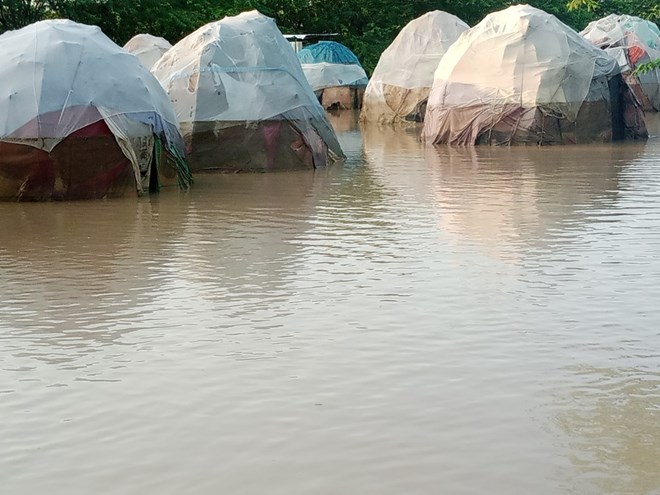
Photo taken on Nov. 21, 2023, shows makeshift structures for internally displaced persons (IDPs) submerged in floodwater at Berdale, Southwest State of Somalia. (Photo by Abdi/Xinhua)
The upcoming heavier than normal Gu rains and floods in 22 districts of Somalia are expected to affect some 770,000 people, the United Nations Office for the Coordination of Humanitarian Affairs (OCHA) said on Sunday.
OCHA said the April-to-June Gu rains have started in most regions of the country, with heavy rains in some areas, though no flash or riverine flooding has been reported yet.
advertisements
“Humanitarians have developed a plan to mitigate the anticipated impact of the Gu rains, but require urgent resources to ensure timely response,” OCHA said in its latest humanitarian update released in Mogadishu, the capital of Somalia.
According to the UN agency, 51 boats are available to evacuate people and deliver assistance in priority locations along the Shabelle and Juba rivers, and to deliver assistance to areas that may be cut off, or evacuate people who may be marooned.
“In various hotspot locations, partners are conducting gap analysis and engaging in early warning and community awareness activities, especially in evacuation sites,” OCHA said.
However, it said, the rains have brought relief to pastoralists and agro-pastoralists across the country, regenerating pasture and filling up water points.
In late 2023, heavy Deyr (October to December) rains and flooding displaced 1.6 million people from their homes, according to the UN.
Last month, OCHA warned that the heavy rains are also expected to trigger cholera outbreaks in areas where the disease has not been observed in years.
OCHA said it has teamed up with its partners and the Somalian health authorities to step up response and preparedness activities, guided by a six-month plan of action that requires 5.9 million U.S. dollars to implement.
